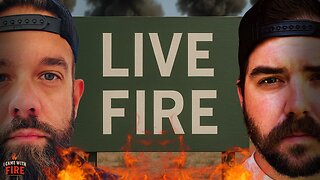Premium Only Content

PRN.Live Presents: A Just Cause 11-25-22 #shorts #shortvideo #shortsviral
From rhinos destroying crops in Nepal, to wolves and bears wandering through
langering livestock on ranches and alarming people in Europe and the
US, the conflict between humans and wildlife is a problem which continues to persist as home spaces for each overlap. Is there a way for people and wildlife to coexist more peacefully?
On today's PEACE TALKS RADIO episode, correspondent
Priyanka Shankar take us on a safari to India and to the US
exploring the main reasons behind human-wildlife conflicts
Focusing on how people can learn to coexist with animals, in
this episode we will first talk to Gerard Martin, a
conservationist based in South India. He focuses on trying to
educate people, especially young children, on how to coexist
with snakes. Death due to snake bites is a very big problem in
hich naturally reflects badly on the animal. But GerardMartin is trying to change that.
We will then travel back to the United States and visit the forests and valleys of the Sierra Nevada and talk to Petros Chrysafis. He has also established predator monitoring tools and non-lethal deterrent measures to ensure livestock and wildlife coexist safely.
Lastly, we will hear from Paula Pebsworth, a primatologist who has worked on mitigating
human-wildlife conflict between primates and humans in many parts of the world and is currently based in Texas. Paula's focus is to find solutions for humans and wild animals to coexist in harmony. She also addresses the more neutral language and narratives
policymakers, the media, researchers, conservationists, and others could be using to help educate people more accurately about human-wildlife conflict.
"For me, the end goal here isn't humans loving animals that they are in conflict with. I just want them to tolerate and understand the animals. Right? So you can, on your own
ree time, hate that animal as much as you want. But I want you to understand that, it
doesn't really do anything that it does in any sort of malevolent way. It just exists. And
its basic biological drives are to find food, to protect its young and to mate. Right. And
to exist as an animal. So tolerance is where I want to be."
~ Petros Chrysafis :, California Wildlife Conservationist
-
 1:08:42
1:08:42
Inverted World Live
14 hours agoFrom Satanist to Exorcist w/ Rick Hansen
289K20 -
 1:47:22
1:47:22
Man in America
16 hours agoHow to Live FREE in the Coming AI-Controlled Police State | Seth on BardsFM
90.5K27 -
 3:17:04
3:17:04
I_Came_With_Fire_Podcast
15 hours agoIs the Culture Healing w/ Aaron Love from @OnesReady
59.2K4 -
 2:05:29
2:05:29
TimcastIRL
10 hours agoLegacy Media In Full Freak Out Over Trump Putin Meeting, "Reached An Understanding" | Timcast IRL
205K147 -
 4:51:25
4:51:25
SpartakusLIVE
12 hours agoThe #1 MOST HYPE Friday Night || Solos to Start - Quads Later
84.6K5 -
 4:45:36
4:45:36
Drew Hernandez
14 hours agoTRUMP X PUTIN TALKS PRODUCTIVE & ADL DESIGNATES AMERICA FIRST AS EXTREMIST
50.2K26 -
 3:39:04
3:39:04
SynthTrax & DJ Cheezus Livestreams
19 hours agoFriday Night Synthwave 80s 90s Electronica and more DJ MIX Livestream Architects of Sound Edition
59.2K4 -
 6:30:35
6:30:35
MattMorseTV
17 hours ago $59.88 earned🔴Trump's meeting with Putin - LIVE🔴
181K106 -
 15:19:22
15:19:22
ttvglamourx
18 hours ago $8.09 earnedOPEN LOBBIES SEARCH AND DESTROY !DISCORD
66.6K4 -
 5:40:15
5:40:15
Fragniac
11 hours ago🟢 BATTLEFIELD 6 BETA - Kill Race w/ The @BrrrapPack❗
53.4K2